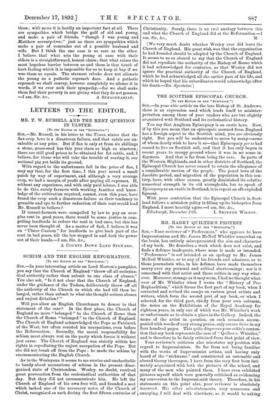SCHISM AND THE ENGLISH REFORMATION.
[To THE EDITOR OF THE " SPECTATOR."] SIR,—In your interesting article on Lord Norton's pamphlet, you say that the Church of England " threw off all ecclesias- tical authority rather than submit to one class of abuses." You also ask, "Is it not clear that the Church of England, tinder the guidance of the Tudors, deliberately threw off all the authority of the Church to which she had till then be- longed, rather than submit to what she thought serious abuses and unjust dictation ? "
Will you allow an English Churchman to demur to that statement of the case ? In the first place, the Church of England no more " belonged " to the Church of Rome than the Church of Rome " belonged " to the Church of England. The Church of England acknowledged the Pope as Patriarch of the West, but often resisted his usurpations, even before the Reformation. Secondly, the moral responsibility for schism must always rest on the party which forces it without just cause. The Church of England was strictly within her rights in repudiating the unjust usurpation of the Pope. But she did not break off from the Pope : he made the schism by excommunicating the English Church.
As to the Wesleyans, it seems to me unwise and uncharitable to bandy about accusations of schism in the present disor- ganised state of Christendom. Wesley, no doubt, received great provocation from the ecclesiastical authorities of that day. But they did not excommunicate him. He left the Church of England of his own free will, and founded a sect which lacked one of the necessary notes of the Church of Christ, recognised as such during the first fifteen centuries of Christianity. Surely, there is no real analogy between this and what the Church of England did at the Reformation.—I
[We very mach doubt whether Wesley ever did leave the Church of England. His great wish was that the organisation he had founded should be adopted by the Church of England. It seems to us as absurd to say that the Church of England did not repudiate the authority of the Bishop of Rome which it had acknowledged for centuries, as that Wesley did not ignore the practical authority of the Church of England, which he had acknowledged all the earlier part of his life, and which he hoped that his subordinates would acknowledge after his death.—En. Spectator.]






































 Previous page
Previous page